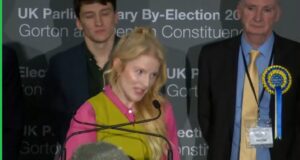THERESA MAY announced a major review of how universities – and the undergraduate students they teach – are funded. The Labour Party is ready with its criticisms of current government policy – but a leading Tory has rushed into the controversy too.
It was at Tory Party Conference back in October that Theresa May announced that there would be freeze in university tuition fees (at the current level of £9,250), that loan repayments would not kick in till a graduate is earning at least £25,000 – and a general review of how universities and their undergraduates are funded.
Nothing much has moved on the review since the announcement. There has been a Cabinet reshuffle, with Justine Greening being replaced as Education Secretary – which may partly account for the delay. New Education Secretary, Damian Hinds MP, is expected to get things moving very soon. Ms Greening was offered an alternative Cabinet post, which she declined in favour of returning to the back benches
It is from those back benches that Ms Greening today launched her attack on government policy – measures which she used to be in charge of delivering. Her main criticism concerns the abolition of maintenance grants for the least well off students – scrapped by the Government last year.
Means tested maintenance grants used to be available to all students, but they were abolished by the Tories for all students except those from the least well off family backgrounds. The Tories were aiming to save public expenditure – but an outcry that total abolition of grants would disproportionately deter poorer students from going into higher education forced a compromise. Grants were retained for the poorest.
Removing maintenance grants was not necessarily a smart idea. It forced far more students to take unskilled and semi-skilled jobs. Employers, not least in retail and hospitality, were keen to take on staff from thus flexible workforce with its high turnover and, therefore, low levels of access to employment right.
The problem was that no new value or extra jobs were generated. Students simply pushed school leavers and adult men with modest qualifications out of unskilled and semi-skilled jobs.
The main concern, however, was the level of debt that students had to deal with – from taking out loans to pay their tuition fees. They began their professional careers with loan repayments that reduced their disposable incomes, so they could not contribute to an increase in domestic consumer spending which the Tories were hoping would occur and then boost the economy.
A further problem was that students who were repaying debt could not save for a deposit to buy a home. Not only was this socially undesirable – it also did nothing to keep the housing market moving.
All these issues have prompted Former Education Secretary Justine Greening MP to speak out today – calling on the Government to restore maintenance grants for poorer students. She said that this would be a progressive measure.
Ms Greening also called on the Government to look again at the level of interest graduates are paying on their student loans – currently just over 6%. This may have been a pre-emptive strike. It is thought that Theresa May would like to explore the idea of charging different tuition fees for different courses. Again, Ms Greening said this would lead to poorer students have a less free choice over which institution they went to and what course they did.
Theresa May’s Government is clinging on by its finger tips. Although most of the focus is on fall-outs over Brexit, it seems that education is a domestic policy which is also contentious. And there may be an MP in the wings who, when the next leadership election comes, will be trying to become the third woman to be a Tory Prime Minister.
•Read more about it:
Theresa May promises “social justice”: take cover now!
Theresa May puts Sharia Law on trial
[Adverts]
 East London News A Force for the community…
East London News A Force for the community…




